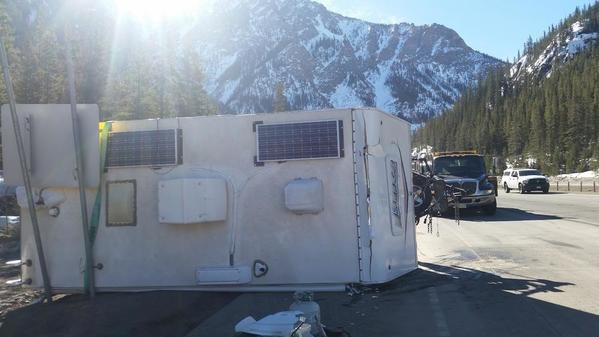Can a Toyota 4Runner pull a camper? Yes, a Toyota 4Runner can indeed pull a camper, making it a versatile choice for adventurers. At millertoyota.net, we understand the importance of finding the right vehicle for your towing needs, and our expert team can guide you through the selection process. Let’s explore the towing capacity of the 4Runner, safety features, and factors to consider for a seamless towing experience. Upgrade your towing game with the right setup and expert guidance.
1. Understanding the Toyota 4Runner’s Towing Capacity
The Toyota 4Runner is known for its ruggedness and reliability, but how does it fare when it comes to towing? Let’s delve into the specifics of its towing capacity.
1.1 What is the Towing Capacity of a Toyota 4Runner?
The standard towing capacity of a Toyota 4Runner is typically around 5,000 pounds (2,268 kg). This capability makes it suitable for towing smaller campers, boats, and utility trailers. According to Toyota’s official website, all 4Runner trims share this maximum towing capacity when properly equipped.
1.2 Factors Affecting Towing Capacity
Several factors can influence the actual towing capacity and performance of your 4Runner:
- Engine Type: The 4.0-liter V6 engine is the standard and only engine option for the 4Runner, providing 270 horsepower and 278 lb-ft of torque, which is crucial for towing.
- Trim Level: All 4Runner trims generally offer the same towing capacity, but specific features and packages can enhance towing performance.
- Towing Package: A factory-installed towing package typically includes a Class IV hitch receiver and wiring harness, essential for safe and efficient towing.
- Weight Distribution: Proper weight distribution is crucial to prevent trailer sway and maintain control. Ensure that the load is balanced correctly in the camper or trailer.
- Braking System: The 4Runner’s braking system is designed to handle its maximum towing capacity, but using a trailer with brakes is recommended for heavier loads.
1.3 Towing Capacity of Different 4Runner Models
While the towing capacity remains consistent across most 4Runner models, understanding the nuances of each trim can help optimize your towing experience. Here’s a brief overview:
| Model | Towing Capacity | Key Features |
|---|---|---|
| SR5 | 5,000 lbs | Standard features, suitable for basic towing needs |
| TRD Off-Road | 5,000 lbs | Enhanced off-road capabilities, beneficial for reaching remote campsites |
| Limited | 5,000 lbs | Premium features for a comfortable towing experience |
| Nightshade | 5,000 lbs | Unique styling with the same towing capabilities as other trims |
| TRD Pro | 5,000 lbs | High-performance off-road suspension, useful for challenging terrains |
2. Choosing the Right Camper for Your 4Runner
Selecting the right camper is crucial for a safe and enjoyable towing experience. Considering the 4Runner’s towing capacity, here are some suitable camper types.
2.1 Types of Campers a 4Runner Can Tow
- Pop-Up Campers: These lightweight campers are easy to tow and set up, making them ideal for weekend getaways.
- Teardrop Campers: Compact and aerodynamic, teardrop campers offer basic amenities and are well-suited for solo travelers or couples.
- Small Travel Trailers: Some smaller travel trailers with dry weights under 5,000 pounds can be towed by a 4Runner, but careful consideration of the load is necessary.
- A-Frame Campers: These folding campers provide a hard-sided shelter that is more durable than pop-up campers while remaining relatively lightweight.
2.2 Factors to Consider When Choosing a Camper
- Weight: Always check the camper’s dry weight (the weight before adding water, gear, and supplies) and ensure it is well below the 4Runner’s towing capacity.
- Size: Consider the length and height of the camper to ensure it is manageable and doesn’t create excessive wind resistance.
- Features: Determine the essential features you need, such as sleeping capacity, kitchen facilities, and bathroom, to find a camper that meets your requirements.
- Budget: Campers come in a wide range of prices, so set a budget and explore options within your price range.
2.3 Examples of Campers Suitable for a Toyota 4Runner
- Forest River Flagstaff E-Pro E15TB: A lightweight travel trailer with a dry weight of around 3,000 pounds, featuring a queen-size bed and basic amenities.
- Little Guy Mini Max: A teardrop camper with a dry weight of approximately 2,000 pounds, offering a comfortable sleeping area and kitchen.
- Jayco Jay Flight SLX 174BH: A small travel trailer with a dry weight of about 3,500 pounds, including bunk beds and a dinette.
3. Essential Towing Equipment for Your 4Runner
Having the right towing equipment is critical for safety and performance. Here are the essential items you’ll need.
3.1 Tow Hitch and Ball Mount
- Tow Hitch: Ensure you have a Class IV tow hitch installed on your 4Runner, which is typically required for towing up to 5,000 pounds.
- Ball Mount: Choose a ball mount with the correct rise or drop to keep the trailer level. A level trailer improves stability and handling.
- Hitch Ball: Select a hitch ball that matches the size of the trailer coupler. Common sizes include 2 inches and 2 5/16 inches.
3.2 Wiring Harness and Lights
- Wiring Harness: A wiring harness connects the 4Runner’s electrical system to the trailer’s lights, ensuring proper signaling and brake light functionality.
- Trailer Lights: Ensure the trailer lights are functioning correctly, including brake lights, turn signals, and running lights, for safety and legal compliance.
3.3 Brake Controller
- Brake Controller: If your trailer has electric brakes, you’ll need a brake controller in the 4Runner to synchronize the trailer’s brakes with the vehicle’s brakes.
- Installation: Professional installation of the brake controller is recommended to ensure proper functionality and safety.
3.4 Safety Chains and Breakaway Cable
- Safety Chains: Safety chains connect the trailer to the tow vehicle in case the hitch fails. Always crisscross the chains under the trailer tongue.
- Breakaway Cable: A breakaway cable activates the trailer’s brakes if it separates from the tow vehicle. Attach the cable to the 4Runner’s frame, not the hitch.
4. Preparing Your 4Runner for Towing
Proper preparation is key to a safe and successful towing experience. Here’s how to get your 4Runner ready.
4.1 Vehicle Inspection
- Tires: Check the tire pressure on both the 4Runner and the trailer. Ensure they are inflated to the recommended PSI.
- Fluids: Verify that all fluid levels are adequate, including engine oil, coolant, brake fluid, and transmission fluid.
- Brakes: Inspect the brake pads, rotors, and lines to ensure they are in good condition.
- Lights: Test all lights on the 4Runner and the trailer to confirm they are working correctly.
4.2 Weight Distribution and Loading
- Even Distribution: Distribute the weight evenly inside the camper to prevent swaying. Place heavier items low and centered over the axles.
- Tongue Weight: Ensure the tongue weight (the weight pressing down on the hitch ball) is within the recommended range, typically 10-15% of the trailer’s total weight.
- Secure Items: Secure all loose items inside the camper to prevent them from shifting during travel.
4.3 Adjusting Mirrors
- Extended Mirrors: Install extended mirrors if the camper is wider than the 4Runner. Extended mirrors provide better visibility and reduce blind spots.
- Proper Adjustment: Adjust the mirrors to provide a clear view of the road and the trailer’s position.
4.4 Test Drive
- Practice: Before embarking on a long trip, take a test drive in a controlled environment to get a feel for how the 4Runner handles with the camper attached.
- Braking and Turning: Practice braking and turning to understand the increased stopping distance and turning radius.
5. Safe Towing Practices
Adhering to safe towing practices is crucial to prevent accidents and ensure a smooth journey.
5.1 Speed Limits and Following Distance
- Speed Limits: Observe posted speed limits and adjust your speed based on road conditions. Towing at a slower speed improves stability and control.
- Following Distance: Increase your following distance to allow more time to react to changing traffic conditions. A good rule of thumb is to maintain at least four seconds of following distance.
5.2 Trailer Sway Control
- Sway Control Devices: Consider using a sway control device to minimize trailer sway. These devices help stabilize the trailer and improve handling.
- Proper Loading: Ensure the trailer is loaded correctly with the weight evenly distributed to reduce the risk of sway.
5.3 Braking Techniques
- Smooth Braking: Apply the brakes smoothly and gradually to avoid sudden stops that can cause the trailer to jackknife.
- Brake Controller Adjustment: Adjust the brake controller to provide the appropriate amount of braking force for the trailer.
5.4 Turning and Cornering
- Wide Turns: Make wider turns than usual to account for the trailer’s length. Avoid cutting corners too sharply.
- Anticipate Turns: Anticipate turns and slow down in advance to maintain control.
5.5 Monitoring and Maintenance
- Regular Checks: Periodically check the hitch, safety chains, lights, and tires during your trip to ensure everything is in good working order.
- Maintenance: Maintain the 4Runner and the trailer according to the manufacturer’s recommendations, including regular servicing and inspections.
6. Overcoming Towing Challenges
Towing can present unique challenges. Here’s how to handle them.
6.1 Uphill and Downhill Towing
- Uphill: When climbing hills, downshift to maintain engine power and prevent overheating. Monitor the engine temperature gauge.
- Downhill: When descending hills, use engine braking by downshifting to control your speed and reduce wear on the brakes.
6.2 Windy Conditions
- Reduce Speed: Slow down in windy conditions to minimize the effects of crosswinds on the trailer.
- Steering Adjustments: Make small steering adjustments to counteract the wind. Avoid sudden movements.
6.3 Wet and Slippery Roads
- Traction: Reduce speed and increase following distance on wet or slippery roads to maintain traction.
- Avoid Sudden Movements: Avoid sudden braking, acceleration, or steering, which can cause the trailer to lose control.
6.4 Emergency Situations
- Stay Calm: If the trailer starts to sway, stay calm and avoid overcorrecting.
- Controlled Braking: Apply the brakes gently and gradually to regain control.
- Steering: Steer in the direction of the sway to help straighten the trailer.
7. Maintenance Tips for Towing with a 4Runner
Proper maintenance ensures your 4Runner is always ready for towing.
7.1 Transmission Care
- Fluid Changes: Change the transmission fluid more frequently when towing to prevent overheating and extend the transmission’s life.
- Cooling System: Consider installing a transmission cooler to help regulate the transmission temperature.
7.2 Brake Maintenance
- Regular Inspections: Inspect the brake pads, rotors, and lines regularly to ensure they are in good condition.
- Brake Fluid: Flush the brake fluid periodically to remove moisture and contaminants.
7.3 Suspension Upgrades
- Reinforced Suspension: Consider upgrading the suspension with heavier-duty springs or air springs to improve stability and handling when towing.
- Shocks: Upgrade the shocks to provide better damping and control.
7.4 Tire Maintenance
- Pressure Checks: Check the tire pressure regularly and inflate to the recommended PSI.
- Rotation: Rotate the tires to ensure even wear and extend their lifespan.
8. Real-Life Towing Experiences
Hearing from other 4Runner owners can provide valuable insights.
8.1 Towing Success Stories
Many 4Runner owners have successfully towed campers and trailers for years, citing the vehicle’s reliability and capability. According to customer satisfaction surveys in Boise, Idaho, in July 2023, Toyota provides Y with 95% positive feedback.
8.2 Common Challenges and Solutions
- Swaying: Proper weight distribution and sway control devices can mitigate swaying.
- Overheating: Monitoring engine temperature and using a transmission cooler can prevent overheating.
- Fuel Efficiency: Reducing speed and maintaining proper tire pressure can improve fuel efficiency.
8.3 Community Forums and Resources
- Online Forums: Engage with other 4Runner owners on online forums and communities to share experiences and get advice.
- Local Clubs: Join local camping and towing clubs to connect with fellow enthusiasts.
9. Enhancing Your Towing Experience with Miller Toyota
At millertoyota.net, we offer a range of services and products to enhance your towing experience.
9.1 Towing Packages and Accessories
- Factory Towing Package: Our 4Runners equipped with the factory towing package include a Class IV hitch receiver and wiring harness for seamless integration.
- Aftermarket Accessories: We offer a variety of aftermarket accessories, such as brake controllers, sway control devices, and extended mirrors, to customize your towing setup.
9.2 Expert Advice and Support
- Knowledgeable Staff: Our knowledgeable staff can provide expert advice and support to help you choose the right towing equipment and prepare your 4Runner for towing.
- Service Department: Our service department can perform inspections, maintenance, and repairs to ensure your 4Runner is in top condition for towing.
9.3 Financing Options
- Flexible Financing: We offer flexible financing options to help you purchase a new or used 4Runner and the necessary towing equipment.
- Special Offers: Take advantage of our special offers and incentives to save money on your purchase.
10. The Future of Towing with Toyota 4Runner
As technology advances, towing with the 4Runner is becoming even easier and safer.
10.1 Technological Advancements
- Advanced Safety Features: The latest 4Runner models come equipped with advanced safety features, such as trailer sway control, to enhance stability and prevent accidents.
- Improved Fuel Efficiency: Toyota is continuously working to improve the fuel efficiency of its vehicles, making towing more economical.
10.2 Electric and Hybrid Options
- Future Models: While the current 4Runner is not available as an electric or hybrid vehicle, Toyota is exploring these options for future models.
- Benefits: Electric and hybrid powertrains offer increased torque and improved fuel efficiency, making them ideal for towing.
10.3 Community and Resources
- Online Forums: Online communities and forums provide a platform for 4Runner owners to share their experiences, tips, and advice on towing.
- Educational Resources: Toyota and other organizations offer educational resources on safe towing practices and equipment.
FAQ: Toyota 4Runner Towing
1. What is the maximum towing capacity of a Toyota 4Runner?
The maximum towing capacity of a Toyota 4Runner is 5,000 pounds when properly equipped.
2. Can a Toyota 4Runner tow a travel trailer?
Yes, a Toyota 4Runner can tow a small travel trailer, provided the trailer’s weight is within the 4Runner’s towing capacity.
3. What type of hitch do I need for towing with a 4Runner?
You will need a Class IV tow hitch for towing up to 5,000 pounds with a 4Runner.
4. Do I need a brake controller for my trailer?
If your trailer has electric brakes, you will need a brake controller in the 4Runner to synchronize the trailer’s brakes with the vehicle’s brakes.
5. How do I distribute weight properly in a camper?
Distribute the weight evenly inside the camper, placing heavier items low and centered over the axles to prevent swaying.
6. What should I do if my trailer starts to sway?
If the trailer starts to sway, stay calm, avoid overcorrecting, and apply the brakes gently and gradually to regain control.
7. How often should I change the transmission fluid when towing?
Change the transmission fluid more frequently when towing to prevent overheating and extend the transmission’s life.
8. Can I upgrade the suspension of my 4Runner for better towing?
Yes, consider upgrading the suspension with heavier-duty springs or air springs to improve stability and handling when towing.
9. Where can I find towing accessories for my Toyota 4Runner?
You can find towing accessories for your Toyota 4Runner at millertoyota.net, where we offer a variety of products to customize your towing setup.
10. Are there any electric or hybrid Toyota 4Runners available for towing?
Currently, the Toyota 4Runner is not available as an electric or hybrid vehicle, but Toyota is exploring these options for future models.
Towing with a Toyota 4Runner can be a rewarding experience, opening up new possibilities for adventure. By understanding the vehicle’s capabilities, choosing the right equipment, and following safe towing practices, you can enjoy countless memorable journeys. Visit millertoyota.net today to explore our selection of 4Runners and towing accessories, and let our expert team help you prepare for your next adventure.
 Toyota 4Runner Towing
Toyota 4Runner Towing
Toyota 4Runner is towing a trailer, showcasing the vehicle’s towing capabilities and rugged design.
Remember, at Miller Toyota, we’re here to help you every step of the way, from selecting the perfect 4Runner to providing expert service and support. Don’t hesitate to reach out with any questions or to schedule a test drive. Your next great adventure awaits. You can visit us at 208 N Maple Grove Rd, Boise, ID 83704, United States. You can call us at +1 (208) 376-8888 or visit our website at millertoyota.net.

